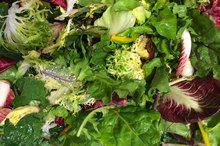Foods to Avoid With Kidney Problems
The kidneys filter waste from the blood and maintain the right balance of fluid in the body. They also play an important role in regulating blood pressure. In general, people with impaired kidney function are advised to eat a diet that supports healthy blood pressure and good blood sugar control. This means avoiding foods high in salt, sugar and trans fats. It may also be important to avoid excessive protein consumption and foods high in potassium and phosphorus. Specific dietary restrictions should be discussed with your doctor since individual requirements vary.
Processed and Fast Food
Processed and fast foods are often high in salt, sugar and unhealthy fats. Avoiding these is a good idea for anyone with kidney problems. This includes snack foods like chips, crackers and cookies as well as prepackaged frozen meals, canned soups and other convenience foods. Even foods that may seem healthy -- like canned vegetables and fruits -- may be high in salt or sugar. Low-sodium canned or frozen vegetables and fruits packed without added sugar are a good option when fresh produce is not available.
- Processed and fast foods are often high in salt, sugar and unhealthy fats.
- Even foods that may seem healthy -- like canned vegetables and fruits -- may be high in salt or sugar.
Too Much Protein
Recommended Food for Kidney Dialysis Patients
Learn More
You may need to limit the amount of protein you eat since excessive protein intake can make kidney problems worse. The National Kidney Disease Education Program advised in June 2014 that people with chronic kidney disease limit daily protein consumption to roughly 0.36 to 0.45 g per pound of body weight 13. This moderate approach to protein consumption provides approximately 54 to 67.5 g of protein daily for a 150-pound person and allows for a modest serving of protein with each meal.
- You may need to limit the amount of protein you eat since excessive protein intake can make kidney problems worse.
- The National Kidney Disease Education Program advised in June 2014 that people with chronic kidney disease limit daily protein consumption to roughly 0.36 to 0.45 g per pound of body weight 1.
Foods High in Potassium and Phosphorus
Depending on the type and severity of kidney problems you are experiencing, you may be advised to limit foods high in potassium and phosphorus since these minerals can build up in the blood when the kidneys are not functioning properly. Your health care provider may advise you to avoid salt substitutes that might be high in potassium and limit foods that are potassium-rich. Foods high in phosphorus include most soft drinks, dairy products, nuts, liver and beans.
A Word of Caution
Renal Diabetic Diet for Breakfast
Learn More
When your kidneys are not functioning normally, your blood might become too acidic or your potassium levels might rise to abnormal levels -- which can be influenced by your diet. Contact your doctor right away if you experience any of these symptoms.
Related Articles
References
- National Institues of Health: National Kidney Disease Education Program: Chronic Kidney Disease (CKD) and Diet -- Assessment, Management, and Treatment
- National Kidney Foundation: Potassium and Your CKD Diet
- National Kidney Foundation: Phosphorus and Your CKD Diet
- Pizzorno J. The kidney dysfunction epidemic, part 1: causes. Integr Med (Encinitas). 2015;14(6):8-13.
- National Kidney Foundation. Sodium and your CKD diet: how to spice up your cooking
- U.S. Centers for Disease Control and Prevention. Get the facts: Sodium and the dietary guidelines. October 2017.
- American Heart Association. How much sodium should I eat per day? May 23, 2018.
- American Heart Association. Hyperkalemia (High Potassium). October 31, 2016.
- National Institute of Health. Potassium fact sheet for health professionals. Updated on July 9, 2019
- The Office of Disease Prevention and Health Promotion. Dietary guidelines for Americans 2015-2020 eighth edition
- American Diabetes Association. Get smart on carb counting
- Wu G. Dietary protein intake and human health. Food Funct. 2016;7(3):1251-65. doi:10.1039/c5fo01530h
- González-parra E, Gracia-iguacel C, Egido J, Ortiz A. Phosphorus and nutrition in chronic kidney disease. Int J Nephrol. 2012;2012:597605. DOI: 10.1155/2012/597605
- National Heart, Lung and Blood Institute. How to lower cholesterol with diet. February 27, 2019.
- American Diabetic Association. Carbohydrate counting. Aug 30,2017.
- National Institute of Diabetes and Digestive and Kidney Diseases. Nutrition for advanced chronic kidney disease in adults. Mar 2014.
Writer Bio
Patricia Culpepper is an Atlanta-based writer who specializes in health and fitness, gardening and general lifestyle pieces. She holds a Bachelor of Business Administration in information systems from the University of Georgia. Additionally, she received a certificate in ornamental horticulture from Gwinnett Technical College and is a certified Level I CrossFit Trainer.









